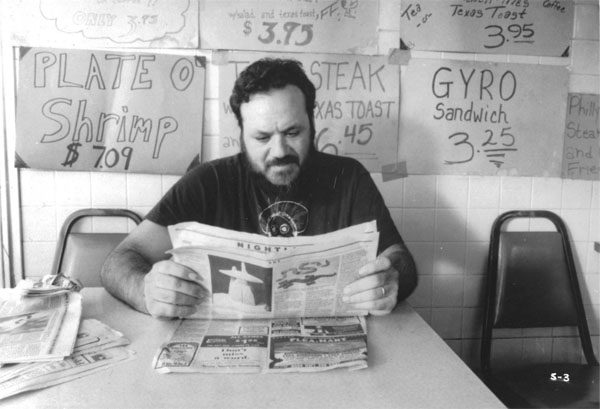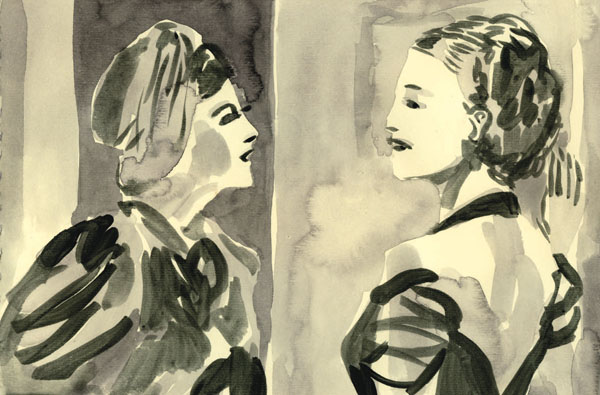New York’s BAMcinématek presents Roberto Rossellini’s Paisan (1946) tonight and Fritz Lang‘s Human Desire tomorrow, a mini-mini-series it’s calling Alfred Hayes, Screenwriter. Co-curators are NYRB Classics, the publisher of Hayes’s novels In Love and My Face for the World to See, and N1FR, n+1’s film review, edited by A.S. Hamrah, who has a great little piece up at Criterion’s Current on Hayes. A snippet: “If his Hollywood novel, My Face for the World to See—written thirteen years later—is any indication, his future screenwriting career in Los Angeles was probably not something he would have cared to envision. Sitting together in a bombed-out Rome, eating together in a black market restaurant, Hayes and Rossellini sketched out scenes with a group of other screenwriters, Italian and American, including Klaus Mann, the son of Thomas Mann, and Federico Fellini. The exhilarating bleakness of postwar Italy, as seen in Paisan’s grainy black and white, contrasts sharply with the Technicolor bleakness Hayes came to know.”
Hamrah will introduce Paisan tonight and, after the screening, talk about it with Tag Gallagher, author of The Adventures of Roberto Rossellini.
Also in New York, Roddy Bogawa: If Films Could Smell, a six-day retrospective, opens tonight at MoMA. Bogawa tells Aaron Cutler about the origins of the title: “The day after Joey Ramone died, I took a camera with me to CBGB to document the things kids were leaving in his memory. While I was shooting someone’s handwritten note, the smells of decades’ worth of piss, blood, and puke started wafting into my nose and I started sobbing. I knew I could smell the movie right there. I wondered if I could evoke these emotions for other people.”
And also at Artforum, Howard Hampton: “The surprise of Slacker was in part the novelty of its subtly organized kitchen-sink aesthetic, its informal formalism, and deadpan nonjudgmental attitudes, but in another sense it was: What took you guys so long?”
David Mamet’s “fealty to the intricacies of narrative, combined with his disdain for conventional psychology, make him a unique figure in the landscape of American cinema,” writes Mike D’Angelo at the Dissolve. “To put it into Mamet-speak: He does his thing. What is that thing?” A survey, broken down into four major periods, follows.
Meantime, the Dissolve‘s film of the week is Albert Brooks’s Real Life (1979). Nathan Rabin‘s keynote has been followed by Scott Tobias on Albert Brooks and “Albert Brooks”—and a roundtable discussion. Taking part are Rabin, Noel Murray, Keith Phipps, Matt Singer, and Scott Tobias.
Robert Sellers’s Very Naughty Boys: The Amazing True Story of HandMade Films will be out in a couple of days, and io9 is running an excerpt: “The making of Time Bandits turned out to be the phoney war; the real blood and guts began once the film entered the editing stage.”
At Indiewire, Robert Koehler argues that the Toronto International Film Festival is in a league of its own.
Peter Bogdanovich: “Onward we go through all the Raoul Walsh movies in my 1952-1970 card-file of pictures I saw during those 19 years.”
For the TLS, David Collard surveys the work of novelist Gerald Kersh, best known for Night and the City (1938), adapted by Jules Dassin in 1950. “Kersh’s admirers have included Angela Carter, Ian Fleming, Jonathan Meades, Chris Petit and Iain Sinclair; he was perhaps the exemplary ‘writers’ writer.'”
“Though Surrealism’s direct inheritors in visual art are debatable (such varied works as Matthew Barney’s Cremaster Cycle and Basquiat’s frenetically improvised paintings owe something to Surrealist thinking, for instance), the United State’s most popular contemporary Surrealist must surely be David Lynch,” argues Eric Dean Wilson in, interestingly enough, a piece for the Los Angeles Review of Books on Adam Fitzgerald’s debut poetry collection, The Late Parade.
Leanne Shapton for the New Yorker: “While working on the Sunday Night Movies series, I would watch movies with an eye to nothing deeper than what might be fun to paint. After making 76 paintings, I noticed that I had repeatedly been drawn to particular elements: letterforms in titles, women’s faces in the center of the screen, and moments when two actors face each other, and are seen in profile. I asked a screenwriter friend how she describes such a two-person scene. It’s called a ‘two-shot,’ she told me. It seems that my attraction to profiles has matured into an appreciation of the two-shot.”
In the works. Robert Towne, whose illustrious screenwriting credits include Chinatown (1974), “is among Matthew Weiner’s new recruits to Mad Men’s writing staff for the upcoming seventh and final season, which AMC announced Monday will unfold in two seven-episode batches in spring 2014 and spring 2015,” reports Cynthia Littleton.
Also in Variety, Patrick Frater reports that Zhang Yimou and Gong Li “have begun production on the aptly named drama Return. Although the two were romantically linked for many years and worked together on more than half a dozen film films including Red Sorghum, The Story of Qiu Ju, and Raise the Red Lantern, they have not been professionally connected since 2006’s Curse of the Golden Flower.” Return, “which deals with issues including the controversial Cultural Revolution period of Chinese history as well as dementia and self-image, is an adaptation of The Criminal Lu Yanshi, a novel by Yan Geling, author of the book that Zhang previously directed as The Flowers of War with Christian Bale.”
Listening. Adam Schartoff talks with Alan Berliner about First Cousin Once Removed.
For news and tips throughout the day every day, follow @KeyframeDaily on Twitter and/or the RSS feed. Get Keyframe Daily in your inbox by signing in at fandor.com/daily.






